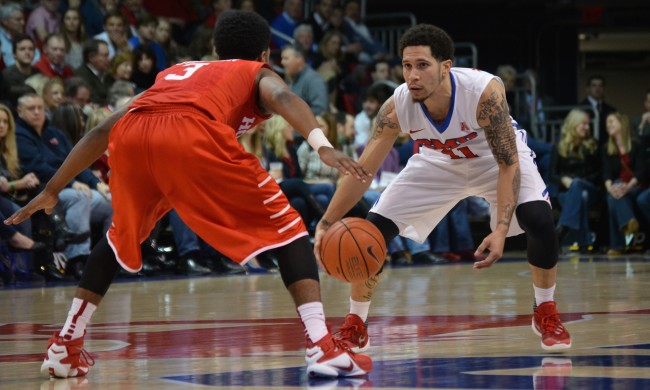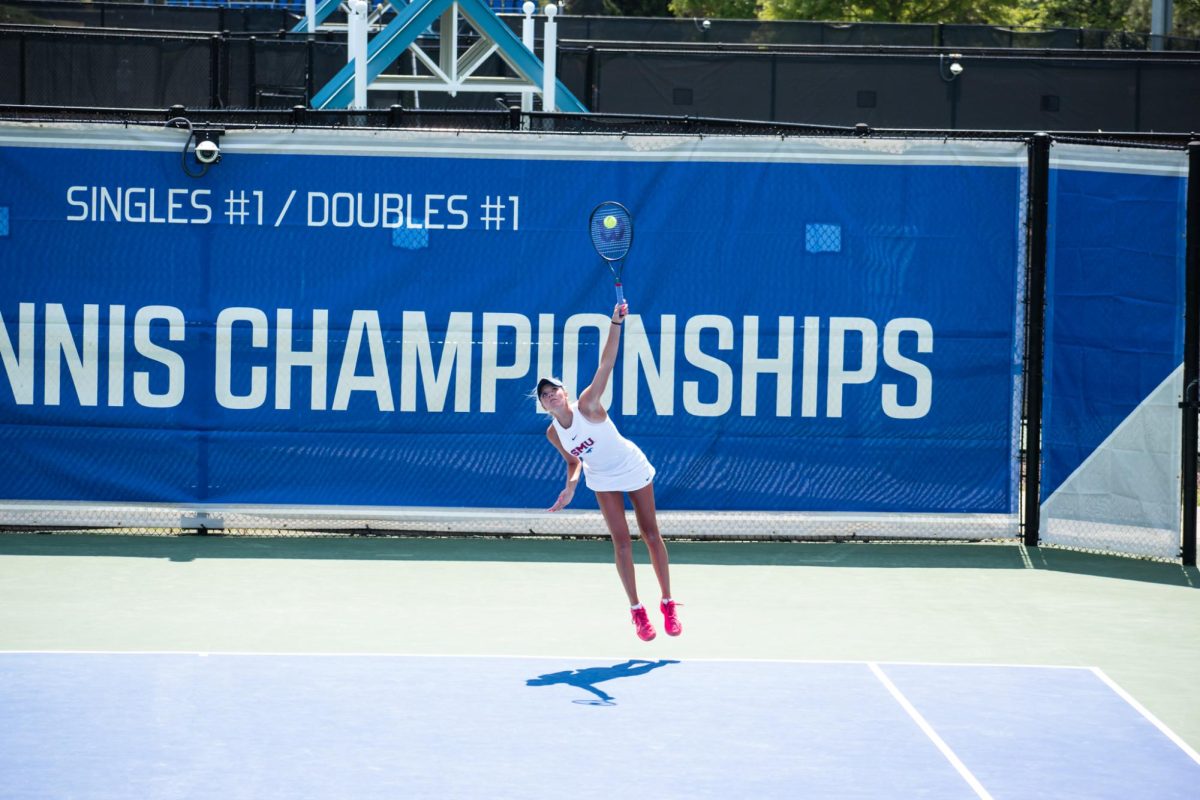
Sterling Brown soared into the air as Nic Moore’s jump shot descended down toward the rim. He couldn’t have timed his leap any better. The ball bounced off the rim, but Brown was right there to tip it in. SMU had its four-point lead back with three and a half minutes to go, 65-61, and seemed like it was finally pulling away after Houston controlled much of the game thanks to leaky SMU defense and a first half full of offensive rebounds.
Or so everyone thought SMU was pulling away. With three seconds left on the shot clock, Damyean Dotson fired from deep on the right wing for a three-pointer. His shot hit the rim, bounced up, and dropped perfectly through the cylinder with three minutes left. Back to a one-point game. Enter renewed nervousness and a little doubt, even from SMU head coach Larry Brown.
“When we got back in the game and looked like we had a chance to take control and Dotson hits the front of the rim, it goes way up and comes back down and in, maybe this is not our night,” Brown said.
Perhaps the most frustrating part of sports is doing something right and still losing. Aaron Harrison’s three consecutive game-winning three-pointers for Kentucky in the 2014 NCAA tournament are prime examples. In the third such game, against Wisconsin in the Final Four, Badgers guard Josh Gasser stood inches away from Harrison on the perimeter with a hand in his face. Harrison, who shot a marginally above-average 35 percent from three that year, obliged and drilled it. Sometimes, good offense beats good defense. Coming up on the short end of that is frustrating.
The first 36 minutes of Tuesday night’s game were similar. Houston answered seemingly every SMU basket, often by way of a contested, low-percentage shot. Dotson’s was the epitome. Some players may let the frustration take over, make silly mistakes and lose the game because of them. Instead, SMU scored right after Dotson’s rim-aided three and never let Houston within one point again, coming away with a 77-73 win.
“It sucks when they’re hitting crazy shots with hands in their face off the glass; that’s the times when it’s really tough to fight through,” SMU forward Markus Kennedy said. “But it’s games when you battle and are in a dogfight, those are the fun ones. Especially when you come out on top.”
SMU had to fight through it all game. The Mustangs thinned an early eight-point deficit to four, only to see it go back to seven points. They closed the half on a 6-0 run that tied the game at 34, which Brown admitted was a shocking score given his team’s sloppy first-half defense. They already faced a lot of pressure as the nation’s last undefeated team, but the pressured mounted after an uncharacteristic half against a team with one top-100 KenPom win. SMU doesn’t want anything to do with that pressure or frustration.
“At halftime, Nic (Moore) was telling our team, ‘let’s enjoy this,’” Coach Brown said. “Pressure happened when we got an (NCAA) ruling. There’s no pressure now. Now is the time just to have fun and play hard for our seniors.”
Fun seems like an arbitrary term in college sports, a gigantic and popular industry filled with pressure. But fun is at the center of being good, of winning, of prevailing in a dogfight and of fighting off frustration. Still, it seems surprising that fun was the halftime message for a team that played a lackluster half of basketball and had to keep dealing with Houston hitting contested or momentum-zapping shots. Winning, especially when coming from behind, is difficult and requires good execution. However, for SMU, the root of it really is having fun. This is not a surprise considering that Brown’s emphasis on fun is nothing new and that SMU genuinely looks like it has fun winning close games in the past.
“If you’re a competitor, you enjoy moments like that,” Brown said. “Coach (Dean) Smith used to write this on the board, and I’ve done it ever since I’ve been coaching: ‘Play Hard. Play Together. Play Smart. Have Fun.’”
Well, a little basketball strategy is part of his former college coach’s saying too, which sounds like just about the opposite of frustration or pressure.
“I asked him one time when I was a young coach, ‘Do you mind if I also said: It’d be nice if we defended and rebounded?’”








